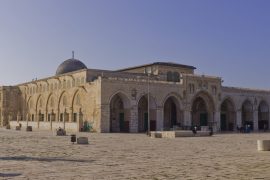Once again The Independent’s Arabic edition has failed to uphold the “world-renowned standards, code of conduct and established ethos” of their English edition (despite this prior announcement by Indy’s editorial board upon the Arabic website’s launch). This time it was West Bank correspondent Khalil Mousa who wrote the following on January 31:
ABBAS DEMANDS THAT ISRAEL RELEASE 25 DETAINEES* OF THE “GENERALS OF PATIENCE”
It is with appreciation and honor that the Palestinians treat the detainees in Israeli prisons. Having sacrificed the flower of their youth so that the Palestinian people’s other individuals would enjoy independence and liberation, they are viewed as “detainees of freedom”. This perspective grows twofold in the case of senior detainees who spent over 20 years since their arrest; thus, whoever spent time which exceeds 25 years is described as a “colonel among the detainees” and a “general of patience”.
The number of colonels among the detainees in Israeli prisons stands at 121, with their number increasing annually since there are more than 500 detainees sentenced for life imprisonment, most of them arrested during the peak of the second intifada between 2002-2003.[…]
Then Mousa continued to report about the Palestinian Authority’s demand for Israel to release a group of 25 prisoners, all imprisoned before 1993.
So, which Palestinians have been imprisoned in Israel since the turbulent years of 2002-2003, seemingly on the verge of becoming “generals of patience” in just a few years?
What kind of people do the Palestinians reportedly admire for “sacrificing the flower of their youth” in favor of others’ “independence and liberation”?
And most importantly, what were they sentenced for?
These questions remain unanswered by Mousa.
Thus, to demonstrate just how deep his (and The Independent’s) whitewashing of terrorism goes, here are a few examples of potential Palestinian “Generals of Patience”:
- Arrested in September 2003, Hamas planner Majdi Zatari was sentenced in May 2005 for 23 cumulative life terms, having murdered 23 civilians aged 3 months–73. Zatari recruited and armed the suicide bomber who targeted the civilians in the Jerusalem No.2 bus attack of August 2003. On the day of the bombing, he also helped the bomber dress as a Haredi man and drove him to the stop where he boarded the bus.
- Arrested in May 2003, Palestinian Islamic Jihad bombmaker Anas Jaradat was sentenced in May 2004 for 35 cumulative life terms, having murdered 14 civilians aged 16–68 and 17 Israeli soldiers. As his PIJ-website biography correctly specifies, Jaradat was the mastermind behind the two 2002 bus suicide bombings which targeted the victims.
- Arrested in March 2003, Hamas bombmaker Abdullah Barghouthi was sentenced in December 2004 for 67 cumulative life terms, having murdered 66 civilians aged 2–79 and one Israeli soldier and wounded over 500 others. Barghouthi pleaded guilty for building the seven deadly bombs (all but one of them human) which targeted the victims, and publicly expressed regret he could not have killed more before being caught. Upon reading his verdict, Barghouthi boasted that he had taught bombmaking to many of his fellows, and that Israel will soon press far greater criminal charges than the ones he accounted for (so far, it has not; Barghouthi’s sentence remains the longest in Israel’s history).
- Arrested in March 2003, Hamas recruiter Raed Houtri was sentenced in July 2004 for 22 cumulative life terms, having murdered 20 civilians aged 15–35 and one Israeli soldier and wounded over 100 others. Houtri recruited the suicide bomber who targeted the civilians in the deadly Tel Aviv Dolphinarium club attack of June 2001.
- Arrested in November 2002, Hamas recruiter and dispatcher Mahmoud Abu Warda was sentenced in November 2004 for 48 cumulative life terms, having murdered 33 civilians aged 16-66 and 13 Israeli soldiers, and wounded dozens of others. All three suicide bombers which Abu Warda recruited and dispatched carried out their attack within one week, between February 25th and March 5th, 1996. (According to Hamas’s official website, in response to his verdict, Abu Warda said that “those who carry out martyrdom-seeking attacks are not committing suicide. Rather, they are martyrs aiming for pleasing their Lord”. He also addressed his judges and the Jewish Israelis present at his trial with the following words: “under the protection of the Islamic state, you lived with pride and dignity. As for other nations and civilizations, they have humiliated and degraded you. Now here you are killing Muslims day and night, and with Allah’s willing the end of your state will be by our existence, at the hands of the Muslim youth.” His final threats were dedicated to the judges: “you have sentenced me for 48 life terms, and I say add fifty more on top of them, your turn will come.”)
- Arrested in May 2002, Hamas commander Abbas al-Sayed was sentenced in January 2006 for 35 cumulative life terms, having murdered 33 civilians, aged 21–90, and two Israeli soldiers. As the head of Hamas’s Tulkarm infrastructure, one of the two attacks he was responsible for carrying out was the 2002 Passover bombing, the deadliest suicide attack in Israel’s history.
- Arrested in April 2002, Fatah (Tanzim and al-Aqsa martyrs brigades) commander Nasser Aweis was sentenced in May 2003 for 14 cumulative life terms, having murdered 12 civilians aged 9 months–79 and two Israeli police officers. Aweis recruited the attackers, trained them, equipped them with weapons and sent them to shoot the victims. He responded to his verdict saying that having “fought the occupation”, he has done “nothing wrong”.
- Arrested in April 2002, Palestinian Islamic Jihad dispatcher Thabet Mardawi was sentenced in February 2003 for 21 cumulative life terms and 40 additional years, having murdered 15 civilians aged 22–85 and six Israeli soldiers and wounded 191 others. Mardawi admitted to having dispatched five deadly suicide bombers and three deadly shootings which targeted the victims and was unrepentant over his deeds. Notably, during the Jenin battle that led to his capture Mardawi showed deprived indifference towards lives of Palestinian civilians as well; thus, he later revealed to his interrogators that he had exploded gas cylinders which destroyed their residences, as part of their firefight with Israeli soldiers.
…
*The Arabic word Aseer أسير (in plural Asra أسرى) means “captive”. It could also be translated as “prisoner”, but (at least outside the Palestinian context) almost always within one of the three terms “political prisoner”, “prisoner of war” and “prisoner exchange”.
The Arabic word for a properly tried and sentenced prisoner is Sajeen سجين, which is rarely used by Arabic media outlets when discussing Palestinians and Arabs in Israeli prisons, even if they are Israeli citizens. This applies to the vast majority of outlets, except some Western-oriented ones like BBC, DW, Alhurra, Reuters and CNN. These outlets tend to use Sajeen more frequently but never exclusively; alongside the occasional Aseer, both Mu’taqal معتقل, “arrestee” and simply Filastini فلسطيني “Palestinian” are also prominent.
However, since Asra are often translated to English by Palestinian officials as “detainees” in order to indicate that the Israeli authorities which tried and sentenced them are illegitimate, this is the translation we chose here as well.
The Arabic version of this post is here.
Related Posts





